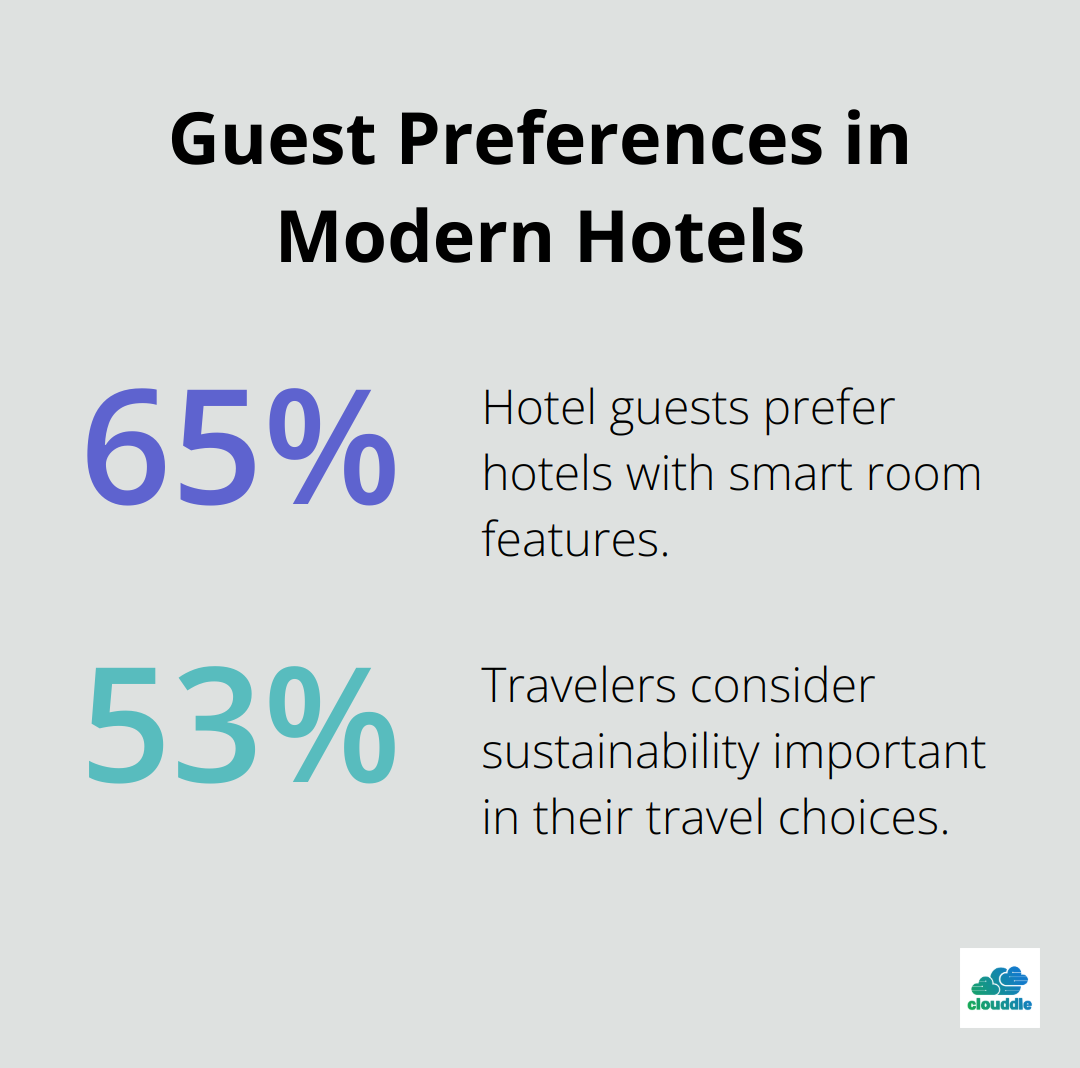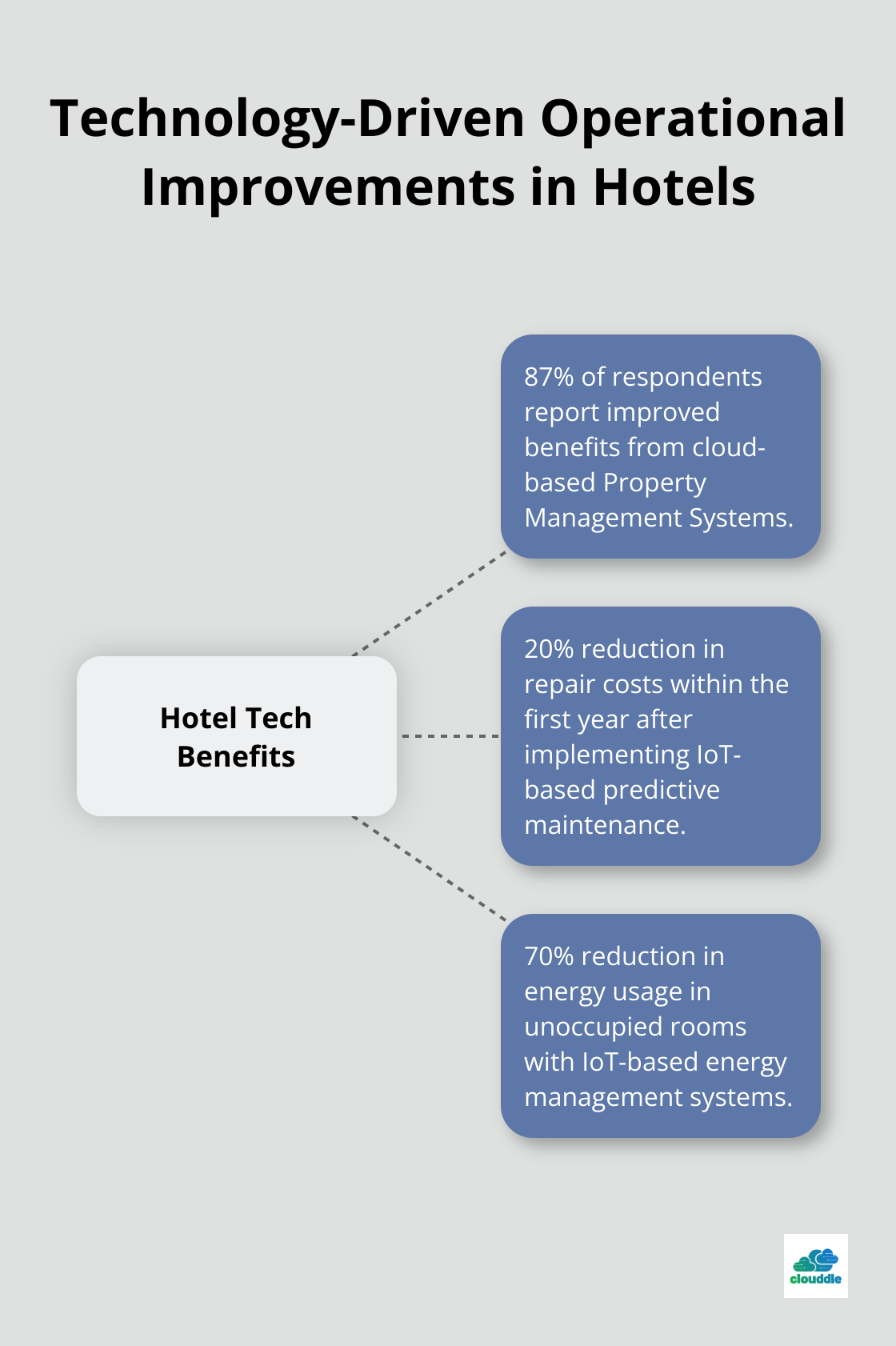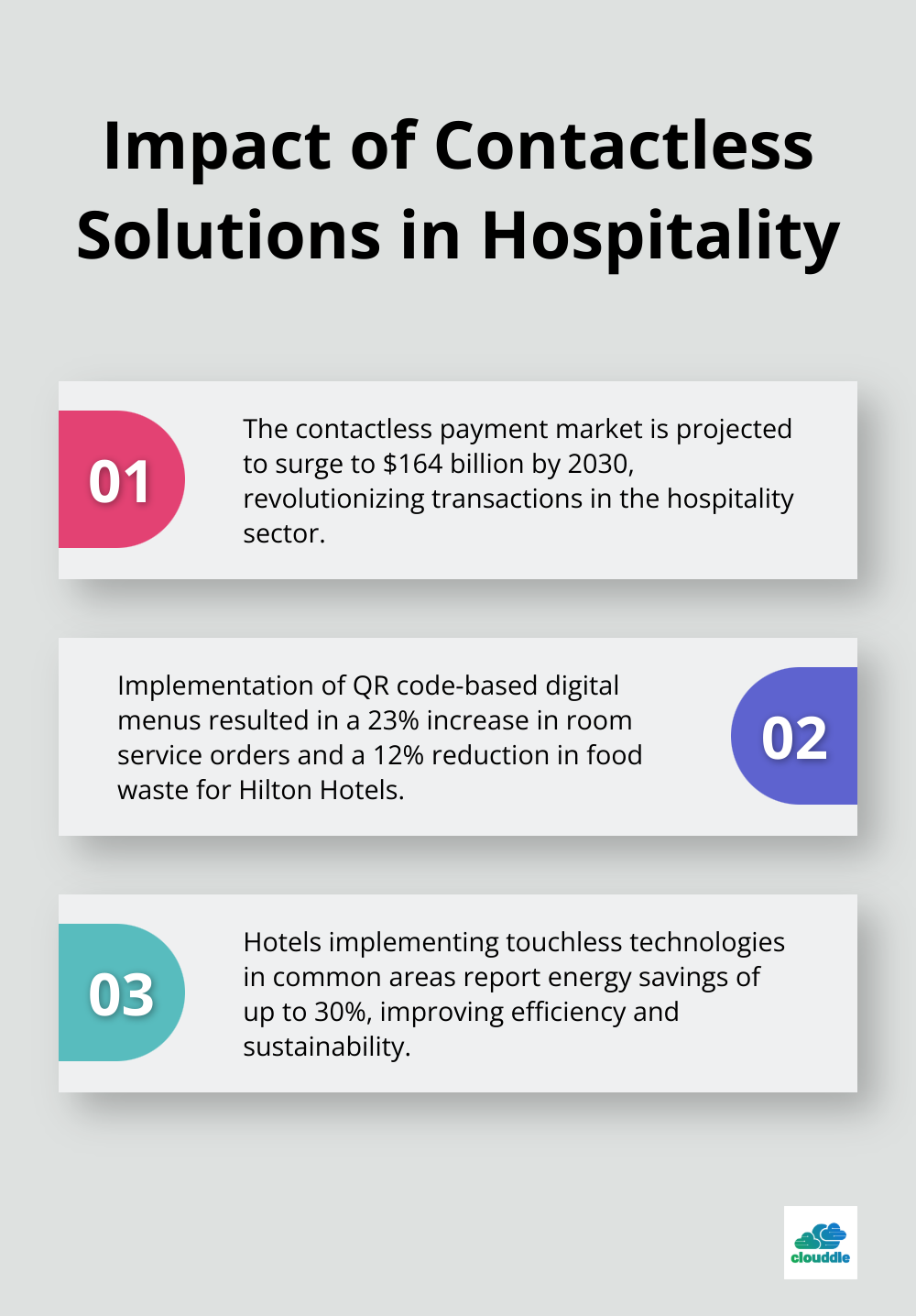Technology and the hospitality industry are evolving at breakneck speed. From mobile check-ins to AI-powered personalized services, hotels are embracing digital solutions to enhance guest experiences and streamline operations.
At Clouddle, we’ve witnessed firsthand how these innovations are reshaping the sector. This blog post explores the game-changing technologies transforming hospitality and their impact on both guests and businesses.
How Technology Revolutionizes Guest Experiences
Technology has transformed the hospitality industry, placing guest experiences at the forefront of innovation. Hotels now offer seamless digital interactions that begin long before a guest arrives, marking a significant shift from traditional processes.
Mobile Check-In: Streamlining Arrivals
Mobile check-in has become a standard feature, with a global hotel brand implementing it at 60% of its properties and seeing guest satisfaction scores rise by 18% within the first year. This technology eliminates the need for guests to visit the front desk, saving time during check-in.
Digital room keys, often integrated with mobile check-in apps, further enhance the guest experience. These secure, smartphone-based keys not only improve convenience but also reduce plastic waste from traditional keycards. Hotels that implement digital keys report a reduction in front desk traffic, allowing staff to focus on more personalized guest interactions.
AI and Big Data: Tailoring Guest Experiences
Artificial Intelligence (AI) and Big Data analytics have revolutionized how hotels understand and cater to their guests. By analyzing past stay information, online behavior, and preferences, hotels now offer highly personalized experiences.
The Hilton chain uses its AI-powered concierge, “Connie,” to provide tailored recommendations to guests. Marriott’s ChatBot handles numerous requests per day, resolving guest queries without human intervention.
Smart Rooms: Comfort at Your Command
Smart room technology has quickly become a standard feature in modern hotels. Smart hotel solutions are becoming increasingly popular, with 65% of hotel guests preferring hotels with smart room features. These systems allow guests to control lighting, temperature, and entertainment with simple voice commands.
InterContinental Hotels Group (IHG) reports that rooms equipped with smart controls see a higher guest satisfaction rate compared to traditional rooms. Moreover, smart energy management systems in these rooms have led to a reduction in energy costs for hotels.

While these technologies offer significant benefits, hotels must balance innovation with privacy concerns. The travel industry is also moving toward sustainability, with 53% of travelers considering this aspect important.
As the hospitality industry continues to embrace these technological advancements, the need for robust infrastructure to support these innovations grows. Network as a Service (NaaS) solutions provide the necessary backbone for hotels to offer cutting-edge services without compromising on security or reliability. This seamless integration of technology sets the stage for the next wave of operational efficiencies in the hospitality sector.
How Hotels Boost Operational Efficiency
The hospitality industry embraces technology to streamline operations, reduce costs, and improve guest satisfaction. Let’s explore how hotels leverage innovative solutions to enhance their operational efficiency.
Cloud-Based Property Management Systems: A Game Changer
Cloud-based Property Management Systems (PMS) revolutionize hotel operations. These systems integrate various aspects of hotel management, from reservations to housekeeping, into a single platform. According to a report by Oracle, 87% of respondents said they have gained or expect to gain improved benefits by deploying a cloud-based PMS.
One major hotel chain reported a 15% increase in staff productivity after implementing a cloud-based PMS. These systems allow staff to access real-time information from any device, enabling quicker decision-making and improved guest service. For smaller hotels, cloud-based PMS can reduce IT costs by up to 50% compared to on-premise solutions.
IoT: Predicting Maintenance and Managing Energy
The Internet of Things (IoT) transforms how hotels approach maintenance and energy management. Smart sensors detect issues before they become problems, reducing downtime and maintenance costs. A luxury hotel in Las Vegas implemented IoT-based predictive maintenance and saw a 20% reduction in repair costs within the first year.
Energy management is another area where IoT excels. Smart thermostats and occupancy sensors automatically adjust room temperatures, leading to significant energy savings. Marriott International reported a 70% reduction in energy usage in unoccupied rooms after implementing IoT-based energy management systems.

Automating Inventory and Supply Chain Management
Automated inventory and supply chain management systems help hotels reduce waste and improve efficiency. These systems use real-time data to predict demand, automate reordering, and optimize stock levels.
A mid-size hotel chain implemented an automated inventory system and reported a 30% reduction in food waste within six months. This not only reduced costs but also aligned with growing guest expectations for sustainable practices.
For supply chain management, blockchain technology emerges as a powerful tool. It provides transparency and traceability, ensuring the quality and authenticity of supplies. A recent study proposes a blockchain-based solution aimed at minimizing food waste generated in hospitality outlets, fostering sustainable food practices.
As hotels continue to adopt these technologies, the need for robust, secure networking infrastructure becomes paramount. Solutions like Network as a Service (NaaS) provide the necessary backbone for these advanced systems while ensuring data security and reliability.
The adoption of these technological advancements significantly enhances operational efficiency, leading to cost savings and improved guest experiences. The key lies in choosing the right solutions that align with the hotel‘s specific needs and guest expectations. As we move forward, we’ll explore how contactless solutions are reshaping the guest experience in the hospitality industry.
How Contactless Solutions Transform Hospitality
The hospitality industry has rapidly adopted contactless solutions, driven by guest preferences for convenience and safety. These technologies enhance the guest experience and improve operational efficiency for hotels.
Digital Payments Revolutionize Transactions
Digital wallets and contactless payments have gained significant popularity in hotels. The contactless payment market is projected to surge to $164 billion by 2030, transforming the retail landscape forever. Hotels that implement contactless payment systems report faster check-out times and increased guest satisfaction.
Marriott International has rolled out contactless payment options across its properties, allowing guests to settle bills using smartphones or contactless cards. This move has reduced check-out times by an average of 4 minutes per guest, significantly improving the overall experience.
QR Codes Enhance Hotel Services
QR codes have found numerous applications in the hospitality industry. For example, West Egg Cafe in Atlanta implemented QR code menus to revolutionize the dining experience, showcasing the potential of this technology in restaurants and hotels.
Hilton Hotels has implemented QR code-based digital menus across its properties, resulting in a 23% increase in room service orders and a 12% reduction in food waste. Guests appreciate the convenience of browsing menus and placing orders directly from their smartphones, while hotels benefit from reduced printing costs and increased efficiency.

Touchless Technology Improves Common Areas
Touchless technology extends beyond guest rooms to common areas, enhancing safety and convenience. Elevators with gesture control or voice activation have become more common in high-end hotels. The Westin Houston Medical Center has installed UV light-emitting robots to disinfect elevators and common areas, providing an extra layer of safety for guests.
Motion sensors for lighting and automatic doors in common areas not only reduce touch points but also contribute to energy efficiency. Hotels that implement these technologies report energy savings of up to 30% in common areas.
Network Infrastructure Supports Contactless Solutions
The adoption of contactless technologies requires robust network infrastructure. Network as a Service (NaaS) solutions (such as those provided by Clouddle) offer the necessary backbone for these advanced systems while ensuring data security and reliability. These solutions enable hotels to implement cutting-edge contactless technologies without compromising on performance or guest satisfaction.
Future Trends in Contactless Hospitality
The future of contactless solutions in hospitality looks promising. Hotels continue to explore new ways to incorporate touchless technologies into their operations. From biometric check-ins to AI-powered virtual concierges, the possibilities for enhancing the guest experience through contactless solutions seem endless.
Wrapping Up
Technology and the hospitality industry have formed an inseparable bond, reshaping every aspect of guest experiences and hotel operations. From mobile check-ins to AI-powered services, these advancements have revolutionized the way hotels operate and interact with their guests. Cloud-based systems, IoT, and automated inventory management have optimized efficiency, reduced costs, and aligned with sustainability expectations.
The rise of contactless solutions has further transformed the hospitality landscape, enhancing guest safety and convenience. Digital payments, QR code menus, and touchless controls have become standard features in modern hotels. As these trends evolve, we expect to see more integration of AI, augmented reality, and robotics in hotel operations.
Clouddle’s Network as a Service (NaaS) solutions provide the backbone for hotels to implement cutting-edge technologies without compromising security or reliability. Our partnership allows hospitality businesses to focus on delivering exceptional guest experiences while we manage the technical complexities. The future of hospitality lies in leveraging technology to create seamless, personalized, and memorable experiences for guests.


